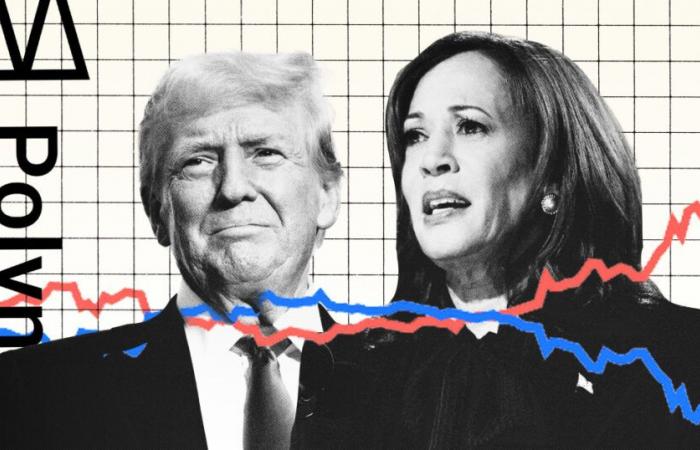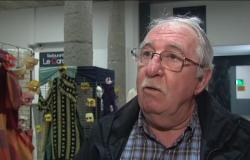While the latest polls suggest that the presidential election may be a close one, some social media advertisements are painting a very different picture.
In some ads for the online betting platform Polymarket, graphs illustrate former President Donald Trump’s lead as “up to 32% in the odds” over Vice President Kamala Harris, claiming the service is “the most accurate way to track the election.”
What Polymarket isn’t always disclosing alongside the ads, though, is that the displayed percentages are actually odds tabulated based on bets placed with its service, not projections based on representative voter polling. Well over half of the ads don’t mention that the numbers are rooted in prediction-based markets.
“The idea is if people disagree with the market price, they have the opportunity to capitalize by buying the side they think is priced too low,” Polymarket CEO Shayne Coplan said in a social media post.
Some ads for the platform read, “Don’t trust the polls — trust the markets.”
The social media ads have flooded Facebook, Instagram, X and other platforms. On Meta alone, Polymarket has poured at least $50,000 into a campaign including 45 advertisements, which promote the odds, according to data available in Facebook’s ad library.
One advertisement — viewed more than 900,000 times on Facebook and Instagram since Oct. 28 — depicts Trump winning in the Polymarket odds, according to the Meta Ad Library. Among the viewers, 20% are men ages 45 to 54 and 12% are women in the same age range. The advertisement was seen the most in California, New York and Texas, with 16%, 11%, and 10% of viewers in those regions, respectively.
Several others include questions such as “Did serving fries help Trump’s chances?” or “Does Trump have all the aura?” Of the 45 Meta ads, many include solo images of Trump, some include side-by-side images of both candidates, and none include solo images of Harris.
A separate sponsored campaign from the right-wing social media personality Shaneyy Richh included nine advertisements promoting Polymarket forecasts.
“The full list of actual conservatives that get polled by political pollsters,” read one ad, which depicted a man squinting at a small piece of paper. “Tired of biased polls? Find out what’s really happening in the 2024 race,” the caption said.
On X — owned by one of Trump’s biggest supporters, Elon Musk — advertisements also promoted the predictions on its search page.
Polymarket, which offers bets in sports, business, science, politics and more, reports that users have spent more than $2.7 billion placing bets on the next president. According to an X post, one user bet $2.2 million on a Harris win.
Based on user bets, Polymarket says Trump’s odds of winning are roughly 65.5% and Harris’ are 34.5% as of Oct. 31.
“Odds on Polymarket are derived from the market price of a contract that pays $1 if an event occurs and expires worthless if it doesn’t,” a Polymarket blog post reads. “For example, someone paying 60 cents for a Trump ‘yes’ contract, implies a 60% chance that he wins.”
Not all are quick to place bets or even trust Polymarket’s system.
“Trump and right-wing influencers are pushing these Polymarket odds as a poll,” Claudio Vallejo, an online creator, said via a TikTok video. “They’re using these odds as proof or evidence that Trump is peaking at the right moment and is so popular that there’s no way he can lose in November. … They’re laying the groundwork for ‘too big to rig.’”
A company spokesperson referred to a “misunderstanding” of the company, explaining the stats are not opinion polls but odds calculated by shares traded on Polymarket. The odds aren’t meant to reflect public opinion; they reflect bettors’ level of confidence in either a Trump win or a Harris win.
“A big point of confusion is that both vote share and odds are expressed as a percent, but do not mean the same thing,” Polymarket wrote on its Substack page.
Coplan recently took to X to defend the platform as “non-partisan,” calling it a “reality check” meant to “harness the power of free markets to demystify the real world events that matter most to you.”
“Polymarket is not about politics,” he wrote in a statement on X on Oct. 25. “This US election cycle, we’ve been pulled onto center stage, as people are fed up with having to make sense of ‘For You’ feeds, pundits, and incongruent polls — we take that responsibility seriously. … Hopefully politics is the first step to get the masses to realize the value of market-based forecasts.”
Though the ads are trending in the U.S., it is prohibited for “U.S. persons,” any citizen or even any temporary resident to take part in the betting, according to Polymarket’s terms.
Currently, Polymarket requires bettors to accept terms and conditions confirming they are “not a resident, national, or agent of the United States” or several other countries where the platform is regulated against.
In 2022, Polymarket was fined $1.4 million by the Commodity Futures Trading Commission, which said that it was illegally running events betting in the U.S.
A federal appeals court recently overturned the CFTC’s decision to prohibit election betting company Kalshi from limiting “U.S. persons” from placing bets on their markets — but Polymarket wasn’t part of that suit, and the law that prohibits betting on Polymarket is still in place. Kalshi’s stats show a 59% and 41% division between Trump and Harris, respectively. The company has also used social media to promote election betting, spending over $140,000 on Meta ads, according to the company’s ad library.
While people in the U.S. aren’t supposed to place their own bets, a Polymarket spokesperson said the platform could be useful for Americans because it acts as a live information source similar to the stock market.
The social media advertisements don’t explicitly encourage people in the U.S. to bet, but they also don’t include a disclaimer about the regulation.
Nevertheless, the site is gaining attention from many right-wing officials and celebrities, including Trump himself.
“We’re up in the polls pretty substantially. They have a new phenomenon, and that’s a gambling poll. They call it the poly poll or something I’ve never heard of,” Trump said at a rally in Michigan on Oct. 18, with a crowd member shouting out “Polymarket” to correct him.
“Polymarket, and I guess it’s 64 to 38, 36, something like that. So that’s not bad. I don’t know what the hell it means, but it means that we’re doing pretty well,” he added.
Though Polymarket called Trump’s reference to the company a “common error” of “confusing Polymarket odds with polls,” a paid advertisement shares the rally clip with the caption: “they call it the pollypoll or something.”
The Instagram reel doesn’t include contain any similar clarification as the one on the blog post.
Musk also took to X to share the predictions — then 67% and 33.1% for Trump and Harris, respectively. In another post, Musk said Polymarket odds were “more accurate than polls.”
A Nov. 3 NBC News poll found Harris and Trump were deadlocked among respondents, each with 49% support from registered voters. Every major poll from the last week shows a split between the candidates from 0 to 3 percentage points, with most differences falling within the margins of error.
Some experts warn people to use caution when they analyze both the polls and the markets.
“When people look at polls, one is just expecting real precision at a specific moment,” John Fortier, senior fellow at the American Enterprise Institute focusing on topics such as election demographics and voting, told NBC News last week. “It’s not that we can’t get good information … but if you’re really expecting polling to tell you … what’s going to happen next Tuesday absolutely, obviously there’s just built-in margin of error.”
Though Fortier said the financial risk associated with markets can be seen as a “more serious” gesture than answers on a poll, he emphasized “real doubts” and warned that “the details matter.”
“I just see the possibilities for more market distortion,” he said. “I’m generally skeptical, and then I’m even more skeptical of a market that is narrower but also excludes American citizens.”






